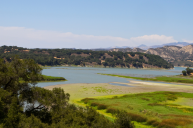The U.S. Fish and Wildlife Service plans to drain an entire southern Illinois lake over safety concerns and to avoid a potentially devastating disaster. Officials list Hurricane Helene as a wake-up call for the state. They want to avoid a similar situation as what happened in North Carolina.
Little Grassy Lake will be drained as part of a multi-year rehabilitation project. The lake will remain open for now but may close in the future. Crab Orchard National Wildlife Refuge manager Justin Sexton explained the situation.
"We'll lower the lake down, but it will not be closed to the public," Sexton said. "It will function basically what it is now, just with a lower water level."
They can control the water levels in the Illinois lake thanks to a valve. Unfortunately, the spillway in the lake, having built in 1942, needs some dire rehabilitation. Fish and Wildlife Service wants to avoid a potentially devastating flood.
"We've been managing the lake at a four-foot drawdown due to some infrastructure compromises that we found in the spillway," Sexton said. "But we realized that we needed to dewater the lake in its entirety out of safety concerns."
Illinois Lake Being Drained
Hurricane Helene made them realize how devastating waiting on the project could be. They want to avoid a similar situation. "Any time you have an untimely release of water with a high-hazard dam, there could be loss of life and loss of property downstream," Sexton said. "That's why we're taking it as seriously as we are. This is prime farmland being affected. These are people's homes."
So starting in December, they will drain the lake over course of several months. They're removing any water above the valve, so they can replace it. But they plan to keep any water below it.
"We've never dewatered the lake since it was built in 1942, so we really don't know what that looks like," Sexton said. "There's a pipe structure 60, 65 feet below the water level. Now it's just where that water will be. Will it be completely dry, or will there be 10, 20 acres of water at the bottom below the pipe structure?
"Most of the ground will be exposed, but we don't know exactly what it's going to look like until we get to that point," Sexton also said.
Draining the Illinois lake will affect people being able to go onto it. At a certain point, it will be unsafe to do so. But officials feel like their hands are tied on this one.
"There's shorter alternatives and longer alternatives. But, you're talking years, not months," Sexton said. "This is a multi-year construction project depending on weather, but that all depends on which alternative [is chosen]."
"Once it's rehabilitated, we'll be able to put water back into the lake and restock the lake," Sexton also said, "and it'll be able to perform as it did for the last 80 years."




